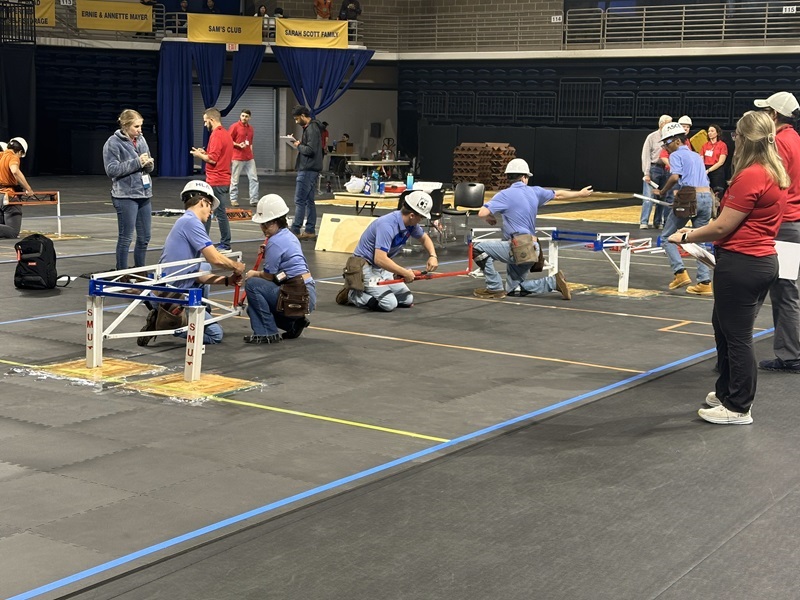Bridging the Gap: Civil Engineering Students Construct Steel-Design Project at ASCE Competition
Civil Engineering students at SMU Lyle merge hands-on project experience with core engineering training at the American Society of Civil Engineers competition

Jalen Johnson and his classmates gathered steel, nuts, bolts, and drills in a Civil Engineering classroom at SMU Lyle School of Engineering. Ever since Johnson was a freshman sketching out ideas and designs, he’d been waiting for the moment to put his skills and knowledge to the test.
“I’ve spent four years now just looking at pen and paper and just drawing things out,” Johnson said. “Finally, I was actually able to use those designs and build something.”
Johnson and a team of four other students constructed a steel bridge spanning approximately 20 feet and bearing the weight of 2,500 pounds to enter the American Society of Civil Engineers Student Steel Bridge Competition. The competition challenges students to extend their classroom knowledge to a practical and hands-on steel-design project that grows their interpersonal and professional skills, encourages innovation, and fosters impactful relationships between students and industry professionals.
— Thinking Master's in Civil or Environmental Engineering? Think SMU Lyle. —
Each student team developed a concept for a scale-model steel bridge, determined how to fabricate it, then planned for an efficient assembly under timed construction conditions at the competition – where their bridge would be load-tested, weighed, and judged on aesthetics.
As bridge builders, the students were able to learn how to improve build time, minimize clearances, operate equipment, and utilize resources and experts for advice. After years of core engineering training in the classroom, students were excited to merge their knowledge with hands-on project experience.

“SMU provides great resources to set students up for success beyond the classroom and emphasizes the importance of a well-rounded education,” said Wade Hunter, sophomore and Civil Engineering major. “You get the value of real-world opportunities and business connections that launch you into the real world quicker than other universities.”
Dr. Brett Story, Associate Professor of Civil & Environmental Engineering and faculty advisor for the project, said the student team received compliments on their design and coordination.
“The judges told me they were grateful to have such a strong, competent, and helpful team to help set up the deflection measurements for the tournament,” Dr. Story said. “One judge was so impressed with our team that he offered to donate materials for next year’s competition. I could not be prouder of our students.”
The SMU Lyle team built their bridge in 38 minutes – a record for the school, and well ahead of the 45-minute time limit. The bridge also remained intact during the load test.
“The students should be very proud that they were able to get so far in the competition,” Dr. Story said. “Every single person, team, and judge I spoke with was extremely complimentary of our team It was a tremendous collective effort and remarkable representation of SMU.”
Written in collaboration with Meadows student Tori Hogan.
About the Bobby Lyle School of Engineering About SMU
SMU's Lyle School of Engineering thrives on innovation that transcends traditional boundaries. We strongly believe in the power of externally funded, industry-supported research to drive progress and provide exceptional students with valuable industry insights. Our mission is to lead the way in digital transformation within engineering education, all while ensuring that every student graduates as a confident leader. Founded in 1925, SMU Lyle is one of the oldest engineering schools in the Southwest, offering undergraduate and graduate programs, including master’s and doctoral degrees.
SMU is the nationally ranked global research university in the dynamic city of Dallas. SMU’s alumni, faculty and nearly 12,000 students in eight degree-granting schools demonstrate an entrepreneurial spirit as they lead change in their professions, community and the world.